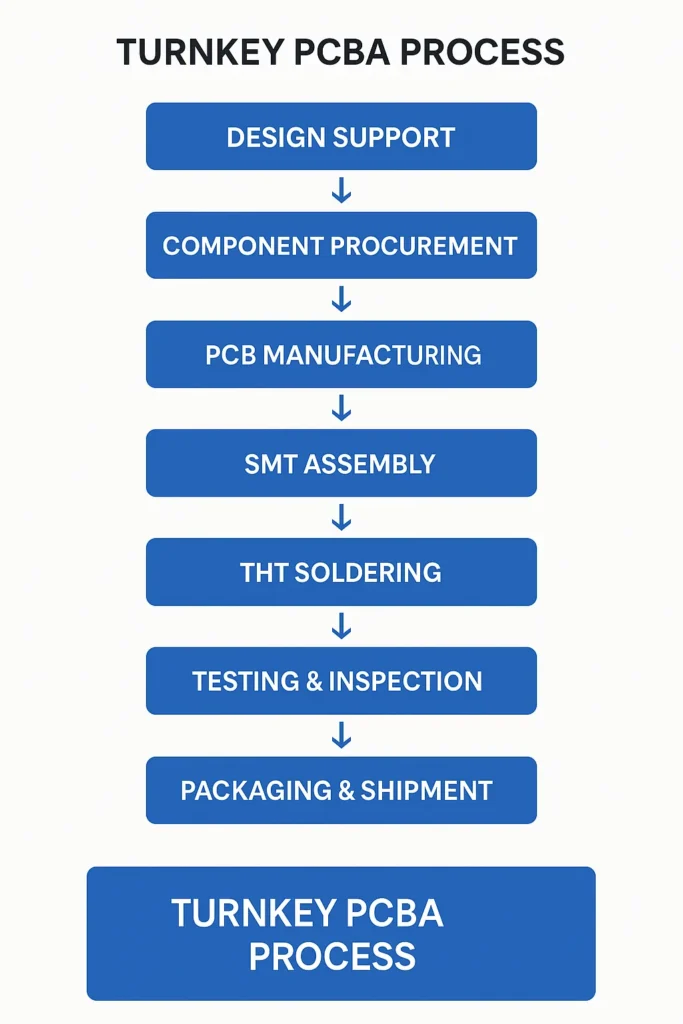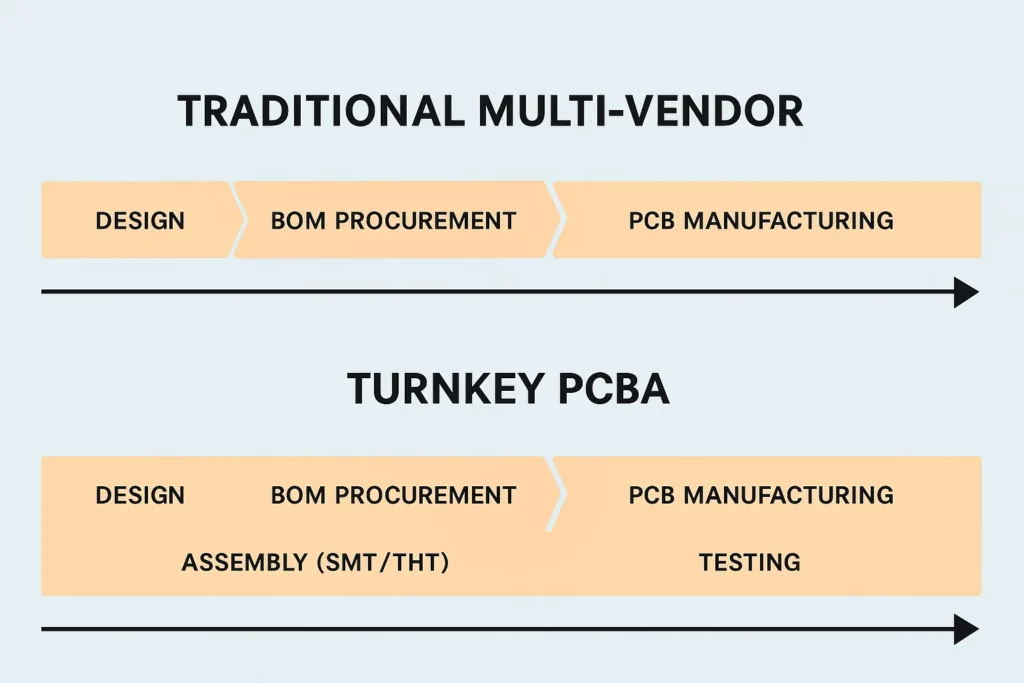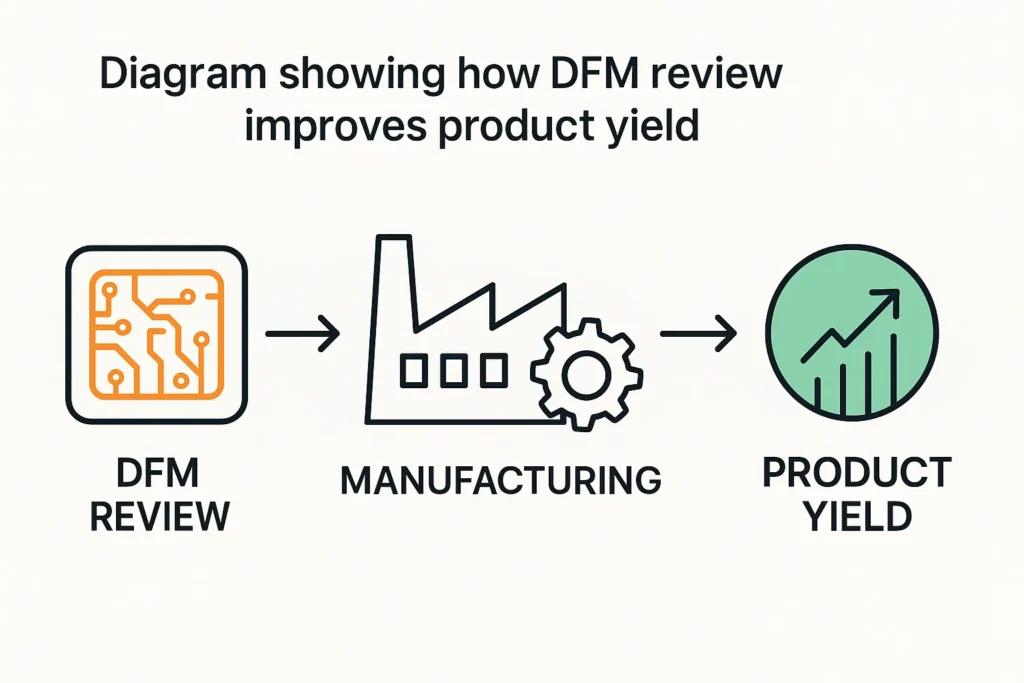Table of Contents
近期文章
How Turnkey PCBA Services Help Startups Reduce Lead Time
For startups focused on developing electronic products, the challenge goes far beyond technical innovation — it’s also a race against time and resource constraints. Bringing an idea to life and turning it into a market-ready product within a tight window can determine whether a hardware startup thrives or fades away.
At the heart of any electronic device lies its most critical component: the PCB and its assembled version, the PCBA.
From circuit design, component selection, and sourcing, to PCB fabrication, SMT (Surface Mount Technology), THT (Through-Hole Technology), functional testing, and final inspection — each step is interconnected and must be executed with precision. If these processes are handled by multiple vendors, startups often face costly coordination, communication gaps, and inconsistent timelines, leading to mismatched materials, delivery delays, and potential quality issues — all of which can derail a product launch.
To solve this, more and more startups are turning to Turnkey PCBA services. In this model, a single provider manages the entire production workflow — from design review and BOM validation to component sourcing, PCB fabrication, assembly, and testing — ensuring seamless integration and centralized control. For early-stage companies aiming for fast prototyping and efficient iteration, turnkey PCB assembly is a proven strategy to improve delivery speed while minimizing risk.
What is Turnkey PCBA?
Turnkey PCBA is a fully integrated electronics manufacturing solution in which a single service provider manages the complete process — including component procurement, PCB manufacturing, SMT assembly, THT soldering, functional testing, and final shipment.
Unlike traditional fragmented supply chains that require startups to coordinate between designers, distributors, PCB fabs, and assembly houses, turnkey PCBA providers eliminate complexity by offering an end-to-end solution under one roof.
This approach ensures faster timelines, fewer communication breakdowns, and reduced production errors. With a robust internal process and cross-functional project management, turnkey PCBA companies handle everything from schematic files to working prototypes, all the way to full-scale production.
Common Turnkey PCBA Services Include:
DFM (Design for Manufacturability) and engineering support
Evaluating design files to optimize for manufacturability, improving yield and reducing rework.Component sourcing and inventory management
Utilizing trusted distributor networks and in-stock components to ensure timely procurement and BOM cost control.Advanced PCB fabrication and precision assembly
Supporting multilayer boards, HDI, flex-rigid structures, and automated SMT processes.Functional and quality testing
Including AOI, X-ray, ICT, and FCT to ensure every board meets electrical and structural standards.Final packaging and global logistics
Customized ESD-safe packaging and coordinated shipping solutions to customers or end markets.

By outsourcing the full PCBA lifecycle to a turnkey provider, startups can conserve time and focus their internal resources on core innovation, fundraising, marketing, and go-to-market strategies. This is particularly valuable during fast-paced prototyping and early-stage product validation phases. Companies like PCBAYCT offer trusted turnkey PCBA services to help hardware startups deliver faster and scale smarter.
Streamlining Development, Saving Valuable Time
For early-stage companies, speed to market can make or break a product. One of the most immediate and tangible advantages of turnkey PCBA services is the ability to significantly reduce the product development timeline. By consolidating every step of the process into a single integrated workflow, startups can move from concept to prototype to production with far greater efficiency.
In the traditional electronics manufacturing model, startups are forced to coordinate between multiple parties — including design engineers, BOM vendors, PCB fabricators, SMT providers, and testing facilities. Each vendor operates on different schedules, communication systems, and expectations. These mismatches often lead to timeline conflicts, miscommunication, and unforeseen delays. As a result, what should be a two-week process can stretch into months.
Turnkey PCBA eliminates these inefficiencies by providing a tightly managed, single-channel production pipeline. Once a startup submits their design files — such as Gerber files, BOM, and assembly drawings — the PCBA provider takes over and handles all technical and logistical steps internally:
Immediate engineering review and DFM/DFT feedback
The in-house engineering team analyzes the design for manufacturability and testability, helping reduce design flaws that could cause delays or rework.Fast component sourcing via local inventory and direct supply chains
Turnkey providers maintain close relationships with authorized distributors and often hold buffer stock to fulfill component needs quickly, reducing lead times and preventing shortages.In-house PCB manufacturing and SMT assembly
By keeping production under one roof, delays caused by inter-factory transfers or third-party logistics are eliminated.Dedicated project manager for centralized communication
Instead of dealing with five different vendors, startups work with a single point of contact who provides real-time updates, resolves issues, and ensures smooth progress.
This one-stop PCBA model drastically improves both the speed and transparency of the entire hardware development cycle. Importantly, it also allows startups to shift their focus from managing operations to growing their business — such as refining the product, engaging customers, preparing for investment rounds, or scaling go-to-market efforts.

Cost Efficiency and Financial Risk Reduction
For startups operating with limited funding, even minor unplanned expenses can severely disrupt the product timeline and business continuity. Choosing a turnkey PCBA solution is not only a way to simplify operations but also a strategic move to control costs and mitigate financial risk.
Bulk Purchasing Power and Lower BOM Costs
Turnkey PCBA providers typically maintain long-term partnerships with authorized distributors and component manufacturers. Thanks to volume purchasing and stable order commitments, they can secure more competitive pricing on components — savings which are passed on to clients. For startups, this means lower BOM costs and more budget flexibility.
Unified Quality Control = Fewer Reworks and Scrap
In multi-vendor environments, when a quality issue arises, it’s often unclear where the problem originated — leading to delays, finger-pointing, or even costly rework. With one-stop PCBA services, quality control is managed consistently across the entire process. A unified system reduces manufacturing defects, scrap, and avoidable errors, resulting in more predictable outcomes and lower costs.
Just-in-Time Procurement = Lower Inventory Pressure
Startups often deal with uncertain order volumes and rapid product iterations. Turnkey PCBA providers can align procurement and assembly schedules dynamically, enabling on-demand production. This prevents overstocking, reduces component obsolescence, and frees up working capital for R&D and marketing.
No Capital Investment in Equipment or Labor
Building an in-house production line is rarely feasible for early-stage startups. It requires not only expensive equipment but also skilled technicians, procurement managers, and quality engineers. Turnkey PCBA eliminates this burden by offering full infrastructure and talent support — letting startups scale without fixed overhead.
More importantly, by placing cost and risk control early in the process, startups gain clearer visibility into cash flow, milestone budgets, and financing plans. Predictable manufacturing costs also enable better communication with investors and stakeholders, showcasing operational discipline and financial planning.
At this stage, turnkey PCB assembly isn’t just about outsourcing production — it’s about building a stable, scalable, and capital-efficient foundation for sustainable growth.
Accelerating Time-to-Market
In the startup world, speed often matters more than perfection. Getting your product to market before the competition — even if it’s a Version 1.0 — can be the difference between building momentum and missing the opportunity window entirely. Turnkey PCBA services are designed to help startups win this “race against time” by compressing the manufacturing timeline at every stage.
Unlike traditional fragmented production, which requires startups to independently manage sampling, sourcing, and scaling, a turnkey provider eliminates unnecessary handoffs and unlocks real acceleration.
Rapid Prototyping and Validation
Established turnkey PCBA providers operate flexible engineering and manufacturing platforms that can produce functional prototypes in as little as 5–10 business days. This allows startups to quickly validate ideas and move on to user testing or investor demos without delay.
Integrated Supply Chain = Less Waiting
With all component sourcing, inventory control, and procurement handled internally, there’s no need to coordinate with multiple suppliers. This reduces wait times, prevents delays due to incomplete kits, and ensures all materials are ready when production starts.
Seamless Transition from Prototype to Mass Production
Once a prototype passes testing, turnkey manufacturers can shift into full production mode on the same line — without retooling or onboarding a new vendor. This continuity allows startups to scale confidently without breaking momentum.
Transparent Project Tracking and Scheduling
Most turnkey PCBA partners offer project management tools or dashboards that provide real-time updates on component sourcing, assembly progress, testing status, and shipment planning. This enables accurate launch timelines and smarter go-to-market coordination.
For startups, this level of visibility and agility is mission-critical. It allows early access to customer feedback, supports iterative improvements, and provides data points for refining performance — all before burning excessive capital.
In a market where timing often determines investor interest and user adoption, working with a fast, responsive turnkey PCBA supplier gives startups a strategic edge. It’s not just about manufacturing faster — it’s about executing faster.
Expert Design and Manufacturing Support
For most startups, the real challenge in hardware development is not just inventing new technology but successfully converting concepts into reliable, manufacturable products. Inexperienced teams often face hidden costs, repeated redesigns, or even dead ends in the production process. This is where turnkey PCBA providers deliver value beyond manufacturing — by offering expert engineering and design support from the very beginning.
Design for Manufacturability (DFM) Reviews
Before production begins, in-house engineers carefully analyze Gerber files, BOMs, and assembly drawings. They identify risks such as improper component spacing, small pad sizes, or routing issues that could lower yields. Correcting these problems early reduces costly rework and ensures smoother volume production.
Component Lifecycle and Supply Risk Analysis
Turnkey providers evaluate each BOM component for lifecycle risks such as discontinuation, long lead times, or price volatility. When necessary, they recommend equivalent alternatives to safeguard supply continuity. For startups, this proactive risk management prevents future project delays.
Customized Test Planning
Every product has unique reliability requirements. Experienced providers design tailored test programs — including ICT (In-Circuit Testing), FCT (Functional Circuit Testing), and aging tests — to ensure boards meet both performance and durability expectations before shipment.
Process Feasibility Consulting
Providers advise on board thickness, layer count, via structures, and surface finishes to ensure compatibility with existing manufacturing processes. This avoids unnecessary complexity, reduces production costs, and ensures the design can be stably reproduced in volume.

By offering these engineering and consulting services, turnkey PCBA companies help startups accelerate development, avoid common pitfalls, and reduce wasted iterations. Startups gain access to an experienced team of engineers and technicians — without the cost of building an in-house department.
In essence, a reliable turnkey PCBA partner is not just a manufacturer, but a co-engineer and strategic collaborator. They bridge the gap between “concept prototype” and “commercial product,” serving as the technical engine that drives a startup’s success.
Scalability and Flexibility
As a startup grows, manufacturing requirements often shift dramatically — from low-volume prototyping to larger production runs that support market demand. Turnkey PCBA services provide the scalability and flexibility needed to handle this transition smoothly.
Seamless Transition from Prototype to Volume Production
Turnkey providers typically operate multiple production lines with different capacity ranges. They can handle anything from a small trial batch of 10 boards to mass production of thousands, without requiring the client to switch factories or renegotiate contracts.
Expandable Supply Chain Resources
Because turnkey PCBA providers manage established procurement networks, they can scale component sourcing rapidly. This ensures that material supply does not become a bottleneck when order volumes increase.
Agile Response to Design Changes
Frequent product updates are common in early-stage hardware. With integrated engineering and BOM management systems, turnkey providers can quickly adapt to design modifications or substitute parts, keeping production aligned with the latest requirements.
Continuity Without Vendor Switching
Switching suppliers during growth often risks delays, IP exposure, and inconsistent quality. A long-term turnkey partner ensures continuity from prototype to mass production, reducing uncertainty and building trust between the startup and its customers.
Reducing Supply Chain and Quality Risks
In the world of hardware startups, supply chain instability and inconsistent quality are among the most critical risks. A single shortage or product defect can derail an entire launch. By vertically integrating supply chains and unifying quality systems, turnkey PCBA providers create a far more reliable production ecosystem.
Secured Component Supply
Thanks to long-term partnerships with authorized distributors and manufacturers, turnkey providers enjoy preferential access to critical components. This ensures stable supply, even during global shortages, and shields startups from sudden price hikes.
Unified Quality Control Systems
From IQC (Incoming Quality Control), SMT AOI (Automated Optical Inspection), ICT/FCT, to X-ray analysis and final burn-in testing, turnkey providers implement layered testing procedures that detect issues early, ensuring consistent product reliability.
Reduced Human Error Through Process Integration
Traditional multi-vendor workflows suffer from file transfers, misaligned standards, and handoff errors. With a one-stop solution, all processes follow unified standards, minimizing errors such as misplaced components or incomplete assemblies.
Ongoing After-Sales and Technical Support
Many turnkey PCBA companies also provide failure analysis, troubleshooting, and technical consulting after delivery. This feedback loop helps startups continuously improve designs, resolve field issues quickly, and maintain brand reputation.
Key Technical Processes of Turnkey PCBA
DFM (Design for Manufacturability) Review
Engineers carefully check Gerber files, BOM, and assembly drawings to identify and correct potential production challenges before manufacturing begins.Component Procurement and Management
Providers leverage global networks and local inventory to secure components quickly, reducing exposure to shortages or long lead times.Synchronized PCB Fabrication and Assembly
Coordinated scheduling prevents mismatches like idle boards waiting for assembly or delayed builds due to late PCB deliveries.SMT Assembly (Surface Mount Technology)
High-speed pick-and-place machines and precision reflow soldering ensure consistent quality even for complex or miniature packages.THT and Mixed Assembly
Wave soldering and skilled manual assembly cover through-hole and hybrid designs, offering flexibility across product types.ICT and FCT Testing
In-circuit testing verifies electrical integrity, while functional circuit testing simulates real-world use cases to validate product performance.Final Inspection, X-Ray, and Packaging
Boards undergo X-ray imaging and final manual checks before being packaged in ESD-safe materials and shipped securely worldwide.
Conclusion

For electronics startups, the three biggest challenges are always the same: time, resources, and execution. A turnkey PCBA solution addresses all three by consolidating the entire product lifecycle — from design and procurement to assembly, testing, and delivery — under one unified system.
This approach not only reduces lead time and lowers costs but also improves quality consistency, minimizes risk, and provides scalability as the business grows. In short, turnkey PCB assembly transforms manufacturing from a liability into a strategic advantage.
Partnering with an experienced provider like PCBAYCT means startups can focus on what truly matters: innovation, fundraising, and market growth. By choosing one-stop PCBA services, startups position themselves to launch faster, scale smarter, and compete stronger.

Barry Ding
CEO
About us
We are PCBAYCT Electronics — your trusted partner in high-quality PCB & PCBA manufacturing, backed by 15+ years of expertise and industry-leading capabilities.
Contact Us
to Begin Your Bessiness

